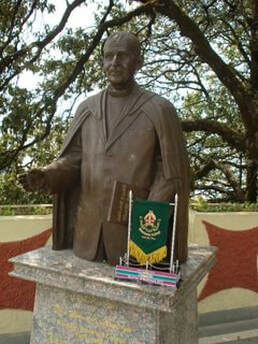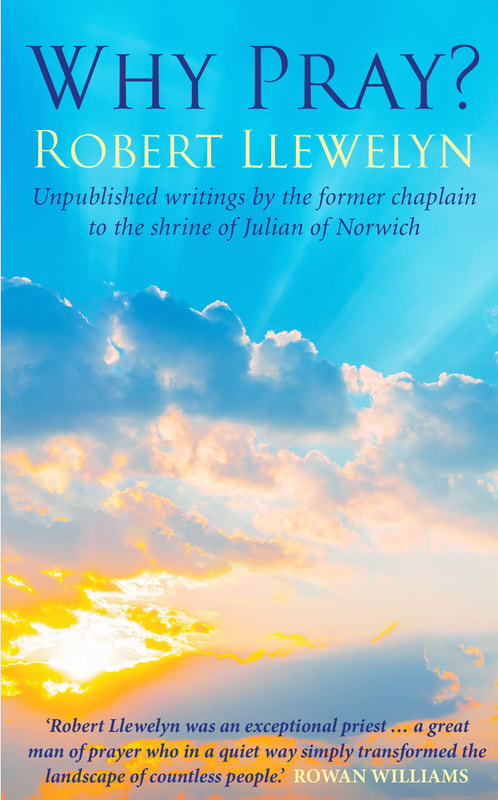"Why Pray?"
A new book by Robert Llewelyn
Unpublished writings by the former chaplain
to the shrine of Julian of Norwich
‘Robert Llewelyn was an exceptional priest … a great man of prayer who in a quiet way simply transformed the landscape of countless people.’ Rowan Williams
|
Through this collection of previously unpublished writings, the late Robert Llewelyn, one of the wisest spiritual teachers of our time, reveals how prayer is beneficial not only for each one of us but for the wider world. His guidance and insights from a lifetime of spiritual discovery include the lessons we can learn from fourteenth-century visionary Lady Julian of Norwich.
What is prayer, and why should we pray? Fr Robert’s words encourage us to know how much we are loved and show us how we can draw nearer to the divine through prayer. He encourages us to try different ways of praying and explains simply how to do silent and contemplative prayer and how to pray for ourselves and others or use the rosary, explaining the fruits and benefits for our wellbeing of praying. At the start of the book, in his 'Philosophy of Life' there is a simple story of why prayer is so important. Robert says, “Somehow, somewhere, in answer to every prayer or praise uttered, or psalm recited or prayerful silence observed, with such sincerity as may be given us, good overcomes evil, light dispels darkness, truth supplants error and, if only in the minutest measure, the world is changed. So, too, for every stranger welcomed or loving deed performed.” Prayer is explained simply and the book shares some of the ways of prayer that Robert offered when asked: 'Silent Prayer', 'Prayer as Praise', 'The Rosary', and 'Praying for Oneself and Others'. The book ends with quotes from Robert's earlier books about his insights on prayer, the fruits of prayer and why it is so good for us. |
ABOUT THE AUTHOR: Robert Llewelyn was an Anglican priest, a retreat leader, an educator, a speaker and a spiritual director, and for many years Chaplain of the Shrine of Lady Julian of Norwich. He wrote ten books on prayer, spirituality, Julian of Norwich and the saints and was editor of the bestselling Enfolded in Love series. He died, aged 98, in February 2008.
Why Pray?, which retails at £6.99, has been compiled and edited by Denise Treissman, who was a friend of Fr Robert and is now his literary executor. It has been illustrated by Norfolk artist Jules Allen. |
EXTRACT from Why Pray?: ‘My Philosophy of Life’.
“For my philosophy of life I must begin with a story. I picture a village in India which has all it needs to maintain a simple social life; everything that is, except that it has no water. There is a large tank which the rain kept filled in better days and a distance away there is a well whose water can be used only by transferring it bucket by bucket. Every time a villager puts aside some personal inclination to make that trek across the fields they are pouring into that village the water of life. As the bucket is brought homewards its bearer can have no idea what this pail of water will do. Will it ease the last moments of a dying child, or fertilize a tiny piece of land, or be there for the washing of clothes or the scrubbing of a floor? Who can say? But the water is brought, immersed in the common pool of healing, and that is enough.
We live in a global village and all that we do is inter-related. Each one of us has the choice whether or not to bring the water of life into our stricken world. St Paul bids us to pray without ceasing and this is something to which we may all aspire, seeing prayer as the perpetual inclination of the heart towards God rather than the movement of the lips, though it is the second which will be needed to establish the first. Every prayer which passes my lips or carries the desire of my heart is, as it were, a bucket filled with the water of life. I have no idea what that prayer will accomplish, nor do I ask. It is enough that I put aside my natural sloth and with such love and devotion as is given me offer what I can to be joined with the aspirations of people of good will in every place.
It is revealed to Julian that we are to pray wholeheartedly even though we find no joy in it, ‘for it does good’. At the very least it does good to myself and that good cannot help affecting the next person I meet and so a chain reaction is set up. But it goes well beyond that. Somehow, somewhere, in answer to every prayer or praise uttered, or psalm recited or prayerful silence observed, with such sincerity as may be given us, good overcomes evil, light dispels darkness, truth supplants error and, if only in the minutest measure, the world is changed. So, too, for every stranger welcomed or loving deed performed.
On April 25th 2002 there died in Buenos Aires at the age of 102 a remarkable lady, Indian by name though European by birth. Indra Devi was still doing her yoga headstand in her late nineties. But more important was her philosophy of life. ‘You give love and light to everyone, those who love you, those who harm you, those whom you know, those whom you don’t know. It makes no difference. You just give light and love’. ‘At eventide’ says St John of the Cross, ‘they will examine you in love’, and he tells us that where there is no love we are to pour love in and we shall draw love out. No matter how far we fall behind the saints of every faith, the way is open for our sacrifice to be made in the knowledge that even a cup of water lovingly offered will not be despised. This I believe to be the only philosophy that can save us all.” Robert Llewelyn From Five Gold Rings, edited by Anna Jeffery (Darton, Longman and Todd, 2003)
We live in a global village and all that we do is inter-related. Each one of us has the choice whether or not to bring the water of life into our stricken world. St Paul bids us to pray without ceasing and this is something to which we may all aspire, seeing prayer as the perpetual inclination of the heart towards God rather than the movement of the lips, though it is the second which will be needed to establish the first. Every prayer which passes my lips or carries the desire of my heart is, as it were, a bucket filled with the water of life. I have no idea what that prayer will accomplish, nor do I ask. It is enough that I put aside my natural sloth and with such love and devotion as is given me offer what I can to be joined with the aspirations of people of good will in every place.
It is revealed to Julian that we are to pray wholeheartedly even though we find no joy in it, ‘for it does good’. At the very least it does good to myself and that good cannot help affecting the next person I meet and so a chain reaction is set up. But it goes well beyond that. Somehow, somewhere, in answer to every prayer or praise uttered, or psalm recited or prayerful silence observed, with such sincerity as may be given us, good overcomes evil, light dispels darkness, truth supplants error and, if only in the minutest measure, the world is changed. So, too, for every stranger welcomed or loving deed performed.
On April 25th 2002 there died in Buenos Aires at the age of 102 a remarkable lady, Indian by name though European by birth. Indra Devi was still doing her yoga headstand in her late nineties. But more important was her philosophy of life. ‘You give love and light to everyone, those who love you, those who harm you, those whom you know, those whom you don’t know. It makes no difference. You just give light and love’. ‘At eventide’ says St John of the Cross, ‘they will examine you in love’, and he tells us that where there is no love we are to pour love in and we shall draw love out. No matter how far we fall behind the saints of every faith, the way is open for our sacrifice to be made in the knowledge that even a cup of water lovingly offered will not be despised. This I believe to be the only philosophy that can save us all.” Robert Llewelyn From Five Gold Rings, edited by Anna Jeffery (Darton, Longman and Todd, 2003)


